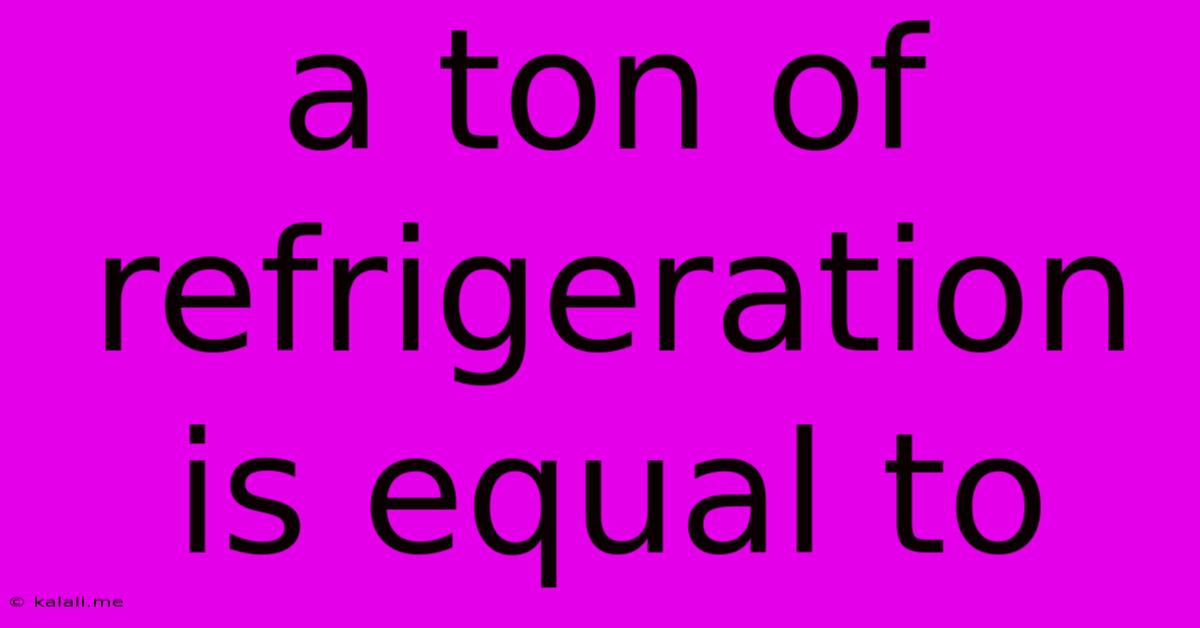A Ton Of Refrigeration Is Equal To
Kalali
Jun 16, 2025 · 3 min read

Table of Contents
A Ton of Refrigeration: What Does It Actually Mean?
Meta Description: Understanding "a ton of refrigeration" can be confusing. This article breaks down what it means, its practical applications, and how it relates to cooling capacity. Learn how to choose the right cooling system for your needs.
For those unfamiliar with the HVAC (Heating, Ventilation, and Air Conditioning) world, the term "a ton of refrigeration" might sound strange. It's not a measurement of weight, but rather a unit of cooling capacity. This article will demystify this common yet often misunderstood term and explain its significance in choosing the right air conditioning or refrigeration system.
What is a Ton of Refrigeration?
A ton of refrigeration, often abbreviated as "ton" or "TR," is a unit that represents the rate at which heat is removed. Historically, it was based on the cooling capacity of a block of ice weighing one ton (2000 pounds) melting over 24 hours. While this historical analogy is helpful for understanding, the modern definition is more precise.
One ton of refrigeration is equivalent to 12,000 BTU/hr (British Thermal Units per hour). BTU is a measure of heat energy; the higher the BTU/hr rating, the more cooling power a system possesses. Therefore, a 2-ton air conditioner has a cooling capacity of 24,000 BTU/hr, a 3-ton system has 36,000 BTU/hr, and so on.
Factors Affecting Cooling Capacity Needs
The number of tons of refrigeration you need depends on several crucial factors:
- Size of the space: Larger spaces require more cooling power. A spacious living room will obviously necessitate a more powerful air conditioner than a small bedroom.
- Climate: Hotter climates naturally demand more powerful cooling systems. A system rated for a mild climate might struggle to keep a space cool in an area with extreme summer temperatures.
- Insulation: Well-insulated buildings retain cool air more effectively, reducing the required cooling capacity. Poor insulation leads to higher energy consumption and the need for a more powerful system.
- Number of windows and their orientation: South-facing windows, for instance, receive significantly more solar heat, increasing the cooling load. The number of windows also impacts the heat gain.
- Occupancy: The number of people in a space contributes to heat generation. More people mean more body heat, necessitating a higher cooling capacity.
- Appliances and equipment: Heat-generating appliances such as ovens, computers, and televisions contribute to the overall heat load within a space.
Choosing the Right System: Avoiding Over- and Under-Cooling
Choosing the right tonnage is critical. An undersized system will struggle to cool the space effectively, leading to discomfort and higher energy bills as it constantly runs at maximum capacity. Conversely, an oversized system will cool too quickly, leading to inconsistent temperatures and increased energy consumption due to frequent cycling on and off.
Professional assessment by an HVAC technician is highly recommended to determine the appropriate tonnage for your specific needs. They consider the factors mentioned above to accurately calculate the required cooling capacity and recommend the optimal system size. This ensures efficient cooling, comfortable temperatures, and cost savings.
Beyond Air Conditioning: Refrigeration Applications
While often associated with air conditioning, the "ton of refrigeration" unit is also applicable to various refrigeration systems. Commercial refrigerators, freezers, and industrial cooling systems all utilize this unit to define their cooling power. The principle remains the same: the higher the tonnage, the greater the cooling capacity.
In conclusion, understanding "a ton of refrigeration" is crucial for selecting the right cooling system. This seemingly simple unit represents a significant amount of cooling power, and choosing the correct size directly impacts your comfort, energy efficiency, and overall cost. Remember to consult a professional for accurate assessment and tailored recommendations.
Latest Posts
Latest Posts
-
How To Create Clickable Image In Html
Jun 16, 2025
-
What Are The Factors Of 121
Jun 16, 2025
-
What Is A Theme Of The Passage
Jun 16, 2025
-
A Company That Provides Access To The Internet
Jun 16, 2025
-
Which Word Is Closest In Meaning To The Underlined Word
Jun 16, 2025
Related Post
Thank you for visiting our website which covers about A Ton Of Refrigeration Is Equal To . We hope the information provided has been useful to you. Feel free to contact us if you have any questions or need further assistance. See you next time and don't miss to bookmark.